青少版新概念英语3B知识点
青少版新概念3B-u27资料

Please be here by eight o'clock at the latest.
colleHale Waihona Puke t[kə' lekt]
collect from从…领取; 接走
v.收集
他接孩子们放学。 He collected the children from school.
你找的那位大夫在屋里。
Do you know the man whose name is Liu Xiang?
你认识那个叫刘翔的人吗?
2. which引导的定语从句 这类从句只能指物,which在从句中作主
语或谓语动词或介词的宾语。
This is the book which you want.
这就是你要的那本书。
I reminded Facer of his promise. 前几天她提醒他做过的保证
A few days ago she reminded him of his
pledge.
valuable [' væljuəbl] adj.贵重 的,宝贵的
他收藏了很有价值的邮票。 He has a valuable collection of stamps.
定语从句
一、定义: 在复合句中修饰名词或代词的从句
叫定语从句。
The man who lives next to us is a lawyer.
The man is a layer. The man lives next to us.
被修饰的名词或代词叫先行词。引导定
语从句的关系代词有who,whom, whose,which,that等和关系副 词where,when,why等。关系代
青少版新概念英语第3B册单词默写表 (中英)
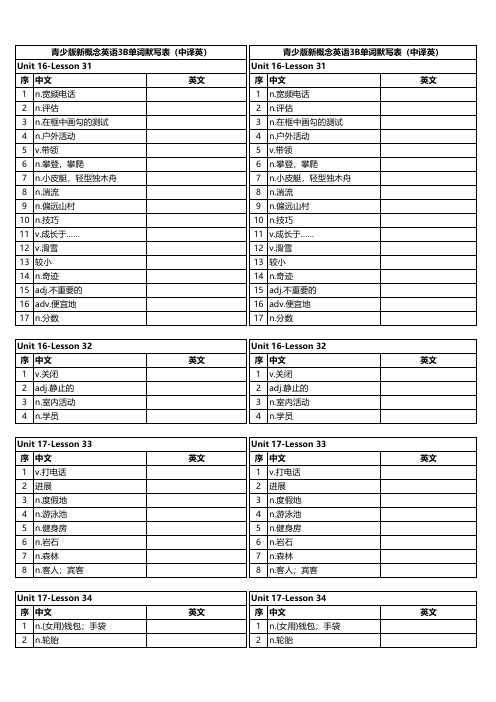
Unit 25-Lesson 49 序 中文 1 n.体象 2 adj.重要的 3 n.外表;外貌 4 adj.不开心的;不高兴的 5 穿上…... 6 pron.他们自己 7 n.镜子 8 n.成年人 9 n.调查 10 n.整容外科 11 n.手术 12 n.文章 13 v.刷 14 v.梳
英文
Unit 17-Lesson 34 序 中文 1 n.(女用)钱包;手袋 2 n.轮胎
英文
3 adj.瘪的 4 体重增加
Unit 18-Lesson 35 序 中文 1 v.低语;耳语 2 adv.在(往)楼上 3 adj.担心的 4 adv.是否 5 v.打斗
Unit 18-Lesson 36 序 中文 1 v.想知道
Unit 24-Lesson 47 序 中文 1 adv.遇到麻烦
Unit 21-Lesson 41
英文
序 中文
英文1 n.美洲狮 Nhomakorabea2 v.盯;注视
3 prep.到..之上
4 n.墙
5 v.消失
6 n.野生动物园
Unit 21-Lesson 42
英文
序 中文
英文
1 v.访问;采访
Unit 22-Lesson 43
Unit 20-Lesson 40 序 中文 1 睡着
英文 英文 英文 英文 英文
英文
3 adj.瘪的 4 体重增加
Unit 18-Lesson 35 序 中文 1 v.低语;耳语 2 adv.在(往)楼上 3 adj.担心的 4 adv.是否 5 v.打斗
新概念青少版3BUnit

多听多练
通过大量的听力实践,熟悉不同 口音、语速和表达方式,提高听
力反应速度。
常见问题及解决方案
听不懂
针对听不懂的问题,可以通过多次重复听、查阅生词和短语、请教 他人等方式解决。
听力速度跟不上
提高听力速度需要长时间的练习和积累,可以通过增加听力训练量、 选择适当难度的材料等方法进行改善。
注意力不集中
范例展示
通过展示优秀的作文范例,让学生学习和借鉴其写作技巧和表达方式,提高自己的写作 水平。
作文批改、评价和反馈机制建立
作文批改
老师对学生的作文进行批改,指出其中的问题并提出修改 建议,帮助学生改进自己的写作。
作文评价
老师对学生的作文进行评价,从内容、结构、语言等方面 进行分析和点评,让学生了解自己的写作水平和需要提高 的方面。
精读和深读策略
引导学生对文章进行深入分析,理解作者观点、文章结构和语言特 点。
阅读笔记和思维导图
鼓励学生做阅读笔记,记录重要信息和感悟;尝试使用思维导图梳 理文章脉络。
阅读理解问题类型及应对方法
事实细节题
指导学生关注文章中的具体 事实和信息,学会在文章中
定位并准确回答问题。
推理判断题
引导学生根据文章内容进 行逻辑推理和分析,理解 作者意图和言外之意。
阅读材料选取及推荐
多样化阅读材料
选择涉及不同主题和文体的文章,包括故事、科 普、历史等,以拓宽学生的阅读视野。
适龄适度原则
根据学生的年龄和英语水平,选择难度适中的阅 读材料,避免过于简单或复杂。
趣味性
选择有趣且能引发学生思考的文章,激发他们的 阅读兴趣和动力。
阅读方法指导与实践
略读和寻读技巧
指导学生运用略读技巧快速浏览文章,了解大意;运用寻读技巧 定位关键信息。
青少版新概念3B知识点总结

定语从句的宾语<动宾或介宾>. • ① 当作动宾<动词后接宾语>时,关系代词可省略. • Do you know the gentleman <whom/who/that> we met jus
Used to do something 表示过去常常做某 事
I used to go out to play. Did you use to go out to play? I did not use to go out to play.
过去完成时态
过去完成时态表示过去某一时间或动作之 前发生的动作 had + 动词的过去分词
疑问代词+不定式
• I don’t know where to begin.
•
who to ask.
•
how to do it.
•
when to start.
•
what to do.
ห้องสมุดไป่ตู้
定语从句
• 1.定语从句的定义:用作定语的从句叫定语从句. • 2.先行词:被定语从句所修饰的名词或代词. • 3.定语从句的位置:紧跟先行词<名词或代词>之后. • 4.引导词:引导定语从句的词<包括关系代词和关系副词>. • 1.who/that指人是主格在定语从句中代替先行词,又作定语从句
TV
间接引语
I/he/she /they+ think<s>/hope<s>/say<s>+that+间接引 语 <主句时态一般和引语时态相同
一张图掌握《新概念英语青少版》3B

一张图掌握《新概念英语青少版》3B《新概念英语青少版》3B的知识点与3A相比,难度增加不少。
我们先来看看3B的知识点。
【图示版】【文字版】1 第16单元1.1 语法1.1.1 间接请求的表达:ask/tell sb. to do sth.1.2 写作1.2.1 句型结构1.2.2 课文摘要1.2.3 提示写话:Paul's Interview1.3 语音1.3.1 间接请求中的语调2 第17单元2.1 语法2.1.1 宾语从句:think, say, hope, tell等引导的间接引语2.2 写作2.2.1 句型结构2.2.2 课文摘要2.3 语音2.3.1 间接引语中的语调3 第18单元3.1 语法3.1.1 宾语从句:由be afraid that, know和mean引导的间接陈述句;由ask (someone) if/whether和know if/whether引导的间接疑问句3.2 写作3.2.1 句型结构3.2.2 课文摘要3.3 语音3.3.1 由if/whether引导的间接疑问句中重读的节奏把控4 第19单元4.1 语法4.1.1 used to do4.2 写作4.2.1 课文摘要4.2.2 问题回答:Life in China 100 Years Ago4.3 语音4.3.1 连读5 第20单元5.1 语法5.1.1 过去完成时5.2 写作5.2.1 课文摘要5.2.2 提示写话:What Happened to My Car?5.3 语音5.3.1 频度副词的语调6 第21单元6.1 语法6.1.1 过去完成时6.1.2 宾语从句:主句动词为过去式的间接引语6.2 写作6.2.1 课文摘要6.2.2 问题回答:A Short News Story6.3 语音6.3.1 间接引语中的语调7 第22单元7.1 语法7.1.1 宾语从句:由when, where, why, how, if/whether引导的间接疑问句7.2 写作7.2.1 句型结构7.2.2 课文摘要7.3 语音7.3.1 间接疑问句中的语调8 第23单元8.1 语法8.1.1 情态动词:can和must,表猜测8.2 写作8.2.1 句型结构8.2.2 课文摘要8.2.3 电子邮件:An Email to a Friend8.3 语音8.3.1 must be和can't be用来表达观点和信念时的读音9 第24单元9.1 语法9.1.1 状语从句:when与while引导的时间状语从句9.2 写作9.2.1 课文摘要9.2.2 提示写话:An Artist's Story9.3 语音9.3.1 /w/的拼写10 第25单元10.1 语法10.1.1 反身代词10.1.2 人称代词(主格、宾格)、形容词性物主代词与反身代词10.2 写作10.2.1 句型结构10.2.2 课文摘要10.3 语音10.3.1 反身代词的连读11 第26单元11.1 语法11.1.1 定语从句:限定性,关系代词作主语11.2 写作11.2.1 句型结构11.2.2 课文摘要11.3 语音11.3.1 限定性定语从句中的语调12 第27单元12.1 语法12.1.1 定语从句:限定性,关系代词作宾语12.2 写作12.2.1 课文摘要12.2.2 问题回答:Things I'll Keep For Ever12.3 语音12.3.1 限定性定语从句中的语调13 第28单元13.1 语法13.1.1 被动语态:一般现在时和一般过去时中13.2 写作13.2.1 课文摘要13.2.2 问题回答:My Job13.3 语音13.3.1 被动语态中的重读和语调14 第29元14.1 语法14.1.1 被动语态:一般将来时和现在完成时中14.2 写作14.2.1 句型结构14.2.2 课文摘要14.3 语音14.3.1 重读的节奏把控与连读15 第30元15.1 语法15.1.1 倒装句:so/neither/nor15.1.2 too与either15.2 写作15.2.1 课文摘要15.2.2 问题回答:A Page in Your Diary 15.3 语音15.3.1 表赞同的语调【小编总结】从以上导图可以看出,3B的知识点主要有:1、语法:间接请求的表达;宾语从句(间接引语和间接疑问句);used to do的用法;过去完成时;情态动词must和can(表猜测);状语从句(when和while引导的时间状语从句);人称代词、物主代词和反身代词;定语从句;被动语态;倒装句。
新概念英语3a3b青少版单词及音标
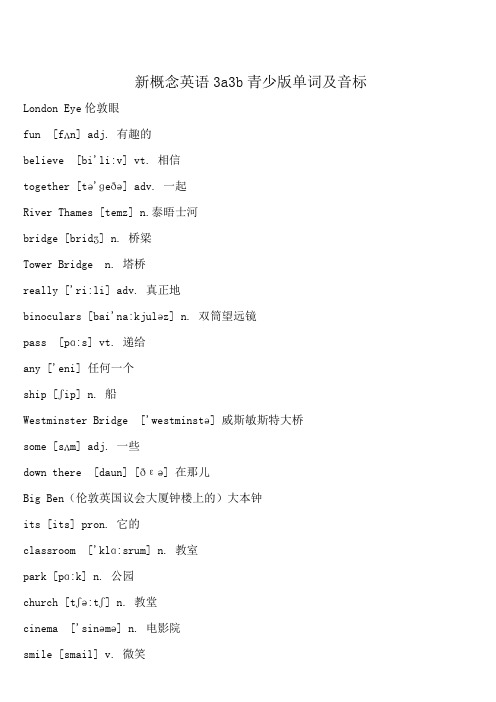
新概念英语3a3b青少版单词及音标London Eye伦敦眼fun [fʌn] adj. 有趣的believe [bi'li:v] vt. 相信together [tə'ɡeðə] adv. 一起River Thames [temz] n.泰晤士河bridge [bridʒ] n. 桥梁Tower Bridge n. 塔桥really ['ri:li] adv. 真正地binoculars [bai'na:kjuləz] n. 双筒望远镜pass [pɑ:s] vt. 递给any ['eni] 任何一个ship [ʃip] n. 船Westminster Bridge ['westminstə] 威斯敏斯特大桥some [sʌm] adj. 一些down there [daun] [ðεə] 在那儿Big Ben(伦敦英国议会大厦钟楼上的)大本钟its [its] pron. 它的classroom ['klɑ:srum] n. 教室park [pɑ:k] n. 公园church [tʃə:tʃ] n. 教堂cinema ['sinəmə] n. 电影院smile [smail] v. 微笑watch [wɔtʃ] v. 看balance ['bæləns] v. 保持平衡do [du: ] v. 做try [trai] v. 尝试as well也easy ['i:zi] adj. 简单的,容易的on one’s knees 跪着good at 善于gymnastics [dʒim'næstiks] n. 体操useless ['ju:slis] adj. 差劲的,无能的Maths [mæθs] n. 数学Music ['mju:zik] n. 音乐take [teik] v. 照(相)take a photo拍照gym [dʒim] n. 体育馆difficult ['difikəlt] adj. 困难的drive [draiv] v. 开,驾驶ride [raid] v. 骑speak [spi:k] v. 说tennis ['tenis] n. 网球cook [kuk] v. 做饭菜,烹调dinner ['dinə] n. 晚餐help [help] v. 帮忙rice [rais] n. 米饭water ['wɔ:tə] n. 水pan [pæn] n. 平底锅chop [tʃɔp] vt. 剁碎onion ['ʌnjən] n. 洋葱spoon [spu:n] n. 匙,勺子get [ɡet] vt. 拿来,获得fork [fɔ:k] n. 餐叉drawer [drɔ: ] n. 抽屉hand [hænd] n. 手wet [wet] adj. 湿的You see,… 你瞧… open ['əupən] v. 开办restaurant ['restrɔnt] n. 餐馆,饭店oh, yeah! 噢,是的!must [mʌst] v. 必须jug [dʒʌɡ] n. 水壶dry [drai] adj. 干的food [fu:d] n. 食物sugar ['ʃuɡə] n. 糖milk [milk] n. 牛奶scanner ['skænə] n. 扫描仪computer [kəm'pju:tə] n. 电脑packet ['pækit] n. 小包coffee ['kɔfi] n. 咖啡tea [ti:] n. 茶叶bottle ['bɔtl] n. 瓶子orange juice橘子汁fridge [fridʒ] n. 电冰箱sea [si:] n. 海eat [i:t] vt. 吃finish ['finitʃ] vt. 完成why [hwai] adv. 为什么why not为什么不?tired ['taiəd] adj. 疲倦的problem ['prɔbləm] n. 难题lots of 许多;大量fish [fiʃ] n. 鱼salad ['sæləd] n. 沙拉dish [diʃ] n. 菜肴drink [driŋk] v. 喝mustn’t [mʌsnt] v. 不能peach [pi:tʃ] n. 桃子Help yourself. [jɔ:'self] 请自便吧!meat [mi:t] n. 肉grape [ɡreip] n. 葡萄buy [bai] vt. 购买bread [bred] n. 面包cake [keik] n. 蛋糕tin [tin] n. 金属盒cheese [tʃi:z] n. 奶酪butter ['bʌtə] n. 黄油surprise [sə'praiz] n. 惊奇,意外lesson ['lesən] n. 课half past… [hɑ:f] …点半a quarter to/past …['kwɔ:tə] …差/过一刻talk [tɔ:k] v. 谈话find [faind] vt. 发现bye [bai] int. 再见when [wen] adv. 什么时候look for寻找homework ['həumwə:k] n. 家庭作业next [nekst] adj. 下一个wash [wɔʃ] n. 洗涤then [θen] adv. 然后breakfast blue ['brekfəst] 早餐忧郁do [du: ] v. 助动词want [wɔnt] vt. 想要not really ['ri:əli] 不完全是,不太something ['sʌmθiŋ] pron. 某事,某物train [trein] v. 训练stomach ['stʌmək] n. 胃have got 有How much?多少……?pot [pɔt] n. 壶start [stɑ:t] v. 开始morning ['mɔ:niŋ] n. 早晨yoghurt ['jəuɡət] n. 酸奶canteen [kæn'ti:n] n. 餐厅terrible ['terəbl] adj. 极坏的,可怕的much [mʌtʃ] 多少fruit [fru:t] n. 水果chocolate ['tʃɔklit] n. 巧克力beer [biə] n. 啤酒paper ['peipə] n. 纸string [striŋ] n. 细绳money ['mʌni] n. 金钱spare [spεə] adj. 空闲的Good morning!早上好!a lot of 很多shy [ʃai] adj. 害羞的introduce sb./sth. to… [,intrə'dju:s] 向……介绍某人/某物studies ['stʌdis] n. 学习,研究(study的复数)to 向true [tru:] adj. 真实的always ['ɔ:lweiz] adv. 总是jacket ['dʒækit] n. 夹克衫magazine [,mæɡə'zi:n] n. 杂志video ['vidiəu] n. 录像带blouse [blauz] n. 女士衬衫skirt [skə:t] n. 裙子vegetable ['vedʒitəbl] n. 蔬菜relative ['relətiv] n. 亲戚kind [kaind] n. 种,类Let me think 让我想想Japanese[,dʒæpə'ni:z] adj.日本的remember [ri'membə] vt. 记得I know!我知道了!lucky ['lʌki] adj. 幸运的another [ə'nʌðə] pron. 另一个like [laik] vt. 喜欢at any time 随时,任何时候British ['britiʃ] adj. 英国的German ['dʒə:mən] adj. 德国的plastic ['plæstik] n. 塑料leather ['leðə] n. 皮革CD player CD播放机Italian [i'tæljən] adj. 意大利的watch [wɔtʃ] n. 手表Korean [kə'riən] adj. 韩国的handbag ['hændbæɡ] n. 手提包clock [klɔk] n. 钟Swiss [swis] n. 瑞士的very much 非常love [lʌv] n. 爱,喜欢salmon ['sæmən] n. 鲑鱼piece [pi:s] n. 一片,一块tonight [tə'nait] n.今晚potato [pə'teitəu] n. 土豆lettuce ['letis] n. 生菜cucumber ['kju:kʌmbə] n. 黄瓜fantastic [fæn'tæstik] adj. 极好的pick [pik] vi. 摘strawberry ['strɔ:bəri] n. 草莓dessert [di'zə:t] n. 甜点healthy ['helθi] adj. 健康的meal [mi:l] n. 膳食,一餐worry ['wʌri] n. 担心cream [kri:m] n. 奶油first [fə:st] adv. 首先hate [heit] vt. 憎恨,讨厌sweet [swi:t] n. 糖果,甜食wine [wain] n. 葡萄酒weekend [,wi:k'end] n.周末shopping ['ʃɔpiŋ] n. 购物supermarket ['sju:pə,mɑ:kit] n. 超市make [meik] vt. 撰写shopping list 购物清单need [ni:d] n. 需要loaf [ləuf] n. 一块,一条Sunday lunch 星期日午餐boring ['bɔ:riŋ] adj.令人厌烦的ice cream 冰激凌nasty ['nɑ:sti] adj. 难吃的anything ['eniθiŋ] pron.任何事,任何物else [els] adv. 另外,其他bar [bɑ:] n. 条soap [səup] n. 肥皂large [lɑ:dʒ] adj.大的match [mætʃ] n. 火柴girlfriend ['ɡə:l,frend] n. 女朋友self-service ['self'sə:vis] adj.自助的menu ['menju: ] n. 菜单assistant [ə'sistənt] n. 服务员soup [su:p] n. 汤tomato [tə'mɑ:təu] n. 西红柿sauce [sɔ:s] n. 调味汁my dear 亲爱的lady ['leidi] n. 女士glove [ɡlʌv] n. 手套already [ɔ:l'redi] adv. 已经jeans [dʒi:nz] n. 牛仔裤newspaper ['nju:s,peipə] n. 报纸toothache ['tu:θeik] n. 牙痛look [luk] vt. 看起来awful ['ɔ:fl] adj.不舒服的dentist ['dentist] n.牙医patient ['peiʃnt] n. 病人make an appointment [ə'pɔintmənt] 约时间见面emergency [i'mə:dʒənsi] n. 急诊today [tə'dei] n. 今天this afternoon 今天下午miserable ['mizərəbl] adj. 痛苦的hope for the best [həup] [best]希望一切都好feel ['fi:l] vt. 感到earache ['iəreik] n. 耳痛day [dei] n. 天,一昼夜Monday ['mʌndei] n. 星期一Tuesday ['tju:zdei] 星期二Wednesday ['wenzdei] 星期三Thursday ['θə:zdei] 星期四Friday ['fraidei] 星期五Saturday ['sætədei] 星期六headache ['hedeik] n. 头痛sick [sik] adj. 生病的stomach-ache ['stʌmək] [eik] n.胃痛flu [flu:] n. 流感cold [kəuld] n. 感冒every ['evri] adj. 每一(个)different ['difrənt] adj. 不同的weather ['weðə] n. 天气mean [mi:n] vt. 意思是quite [kwait] adv. 相当,十分ever ['evə] adv. 曾经warm [wɔ:m] adj. 温暖的England ['iŋɡlənd] n. 英国summer ['sʌmə] n. 夏天sunny ['sʌni] adj. 阳光灿烂的Atlantic [ət'læntik] n. 大西洋climate ['klaimit] n. 气候often ['ɔfn] adv. 经常rain [rein] n. 下雨sometimes ['sʌmtaimz] adv.有时,偶尔especially [i'speʃəli] adv. 尤其dʒ [d?u:'lai] n. 七月cool [ku:l] adj. 凉爽的difficulty ['difikəlti] n. 问题,困难change [tʃeindʒ] n. 变化month [mʌnθ] n. 月份temperature ['tempəritʃə] n.温度China ['tʃainə] n. 中国spring [spriŋ] n. 春天sun [sʌn] n. 太阳shine [ʃain] n. 闪耀,发光cloudy ['klaudi] adj. 多云的season ['si:zən] n. 季节usually ['ju:ʒuəli] adv. 经常never ['nevə] adv. 从不autumn ['ɔ:təm] n. 秋天winter ['wintə] n. 冬天snow [snəu] n. 下雪France [frɑ:ns] n. 法国Russia ['rʌʃə] n. 俄罗斯Africa ['æfrikə] n.非洲windy ['windi] adj. 刮风的same [seim] adj. 同样的Many happy returns![ri'tə:nz]长命百岁August [ɔ:'ɡəst] n. 8月year [jiə] n. 年present ['preznt] n. 礼物bike [baik] n. 自行车gear [ɡiə] n. 齿轮traffic ['træfik] n. 交通dangerous ['deindʒərəs] adj. 危险的about [ə'baut] prep. 关于safe [seif] adj. 安全的date [deit] n. 日期question ['kwestʃən] n.问题ask [ɑ:sk] v. 提问special ['speʃəl] adj. 特别的January ['dʒænjuəri] n. 1月February ['februəri] n. 2月March [mɑ:tʃ] n. 3月last [lɑ:st] adj. 最后的December [di'sembə] n. 12月after ['ɑ:ftə] prep. 在……之后before [bi'fɔ:] prep. 在……之前April ['eiprəl] n. 4月May [mei] n. 5月June [dʒu:n] n. 6月September [sep'tembə] n. 9月October [ɔk'təubə] n. 10月November [nəu'vembə] n. 11月parent ['pεərənt] n. 父母international [,intə'næʃnəl] adj.国际的event [i'vent] n. 比赛race [reis] n. 赛跑mile [mail] n. 英里runner ['rʌnə] n. 赛跑选手world [wɔ:ld] n. 世界Australia [ɔ'streiljə] n. 澳大利亚compete [kəm'pi:t] 竞争European [,juərə'pi:ən] n. 欧洲impressive [im'presiv] adj. 令人印象深刻的rank [ræŋk] n. 等级marathon ['mærəθən] n. 马拉松practice ['præktis] n. 练习Moroccan [mə'rɔkən] n. 摩洛哥人Brazilian [brə'zilən] n. 巴西人Canadian [kə'neidiən] n. 加拿大人German ['dʒə:mən] n. 德国人Chinese [,tʃai'ni:z] n. 中国人name [neim] vt. 命名New York [jɔ:k] 纽约country ['kʌntri] n. 国家Australian [ɔ'streiliən]n.澳大利亚人live [liv] vt. 生活Sydney ['sidni] n. 悉尼language ['læŋɡwidʒ] n. 语言Brazil [brə'zil] n. 巴西Sao Paulo 圣保罗Portuguese [,pɔ:tju'ɡi:z] n. 葡萄牙语Germany ['dʒə:məni] n. 德国Berlin [bə:'lin] n. 柏林Canada ['kænədə] n. 加拿大America [ə'merikə] n. 美国。
青少版新概念英语3B单词默写
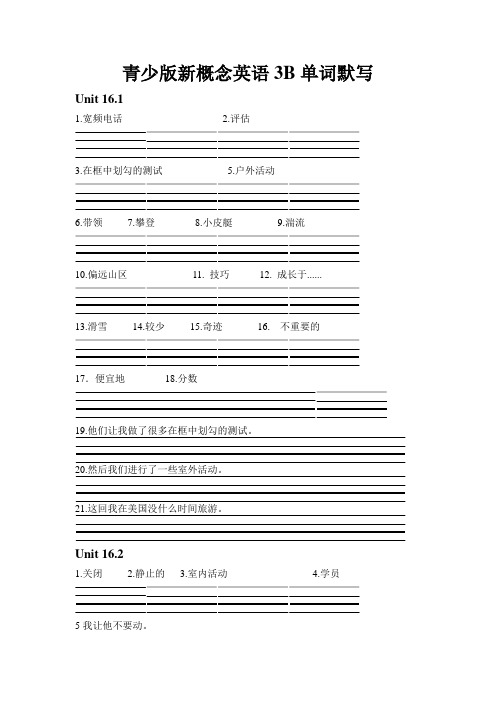
青少版新概念英语3B单词默写Unit 16.11.宽频电话2.评估3.在框中划勾的测试 5.户外活动6.带领7.攀登8.小皮艇9.湍流10.偏远山区11. 技巧12. 成长于......13.滑雪14.较少15.奇迹16. 不重要的17.便宜地18.分数19.他们让我做了很多在框中划勾的测试。
20.然后我们进行了一些室外活动。
21.这回我在美国没什么时间旅游。
Unit 16.21.关闭2.静止的3.室内活动4.学员5我让他不要动。
6.他正准备把所有的钱都花掉,我告诉他要节省钱。
Unit 17.11.打电话2.进展3.度假地4.游泳池5健身房 6.岩石7.森林8. 客人9.保罗说他从未见过这么多漂亮的女人。
10.世界上最奢华的度假地。
11.我想他没有告诉她这些。
Unit 17.21.钱包2.轮胎3.瘪的4.体重增加5罗伯特怎么了?他说他考试没及格。
你是怎么知道的?因为他说的。
6.你的表慢了么?不,我不这么认为。
Unit 18.11.低语2.在楼上3.担心的4.是否5打斗6.你问妈妈我能不能学空手道了么?7.他不知道你会不会同意?8. 他怕你不答应。
9.武术也是有规则要遵守的。
Unit18.21.想知道2.我想知道克莱尔是否找到了工作?你为什么不问她是否找到了呢?Unit19.11.留下2.预定3.习惯做4.游泳池5.活跃的6.来这儿是我妻子的主意。
7.我小的时候经常出去玩。
8.有趣的是,这样休假并没有减轻我的劳累感。
9.我过去也这样认为。
Unit 19.21.流行音乐2.热衷于3.喜欢4.蜘蛛5.他听流行音乐么?他过去听,但是现在不听了。
6.你喜欢游泳么?我过去从不喜欢,但是我现在喜欢。
Unit 20.11.门铃2.回答3.邀请进屋4. 回答5.婚礼6.记录家庭活动的电影7.我刚到家,我的表姐爱丽斯就来按门铃了。
8.我刚把车停在外面。
9.“我4月就要结婚了”。
她说。
10.“恭喜你”。
我答道。
11.不幸的是,恐怕我的确会做的很好。
青少版新概念英语3B-第30单元 Unit30

Lucy is hungry,too.
2.Robert isn't thirsty.
Lucy isn't thirsty,either.
Try to translate!Believe yourselves!
1.Robert is hungry.
Lucy is hungry,too.
=So is Lucy.
He is a sudent.---So am I. He likes Maths.---So do I He likes Maths.---So does she. He missed the train.---So did she. He will come here.---So will she.
我也不会。
Let's try more!
1.Robert can speak English.
So can I.
2.Robert can't speak English.
Neither/Nor can I.
,too=_______译为: ,either=_____译为:
注意助动词的选择、人称及时态的变化:
KELLY: I walk to the bus every day.
That’s not enough, either.
get more exercise in my
CAROL: I ask myself how I can
ordinary life.
But I don't have any idea.
He is a sudent.---So__I. He likes Maths.---So__I He likes Maths.---So__she. He missed the train.---So__she. He will come here.---So___she.
新概念英语青少版3B

Lesson 161.email sb. 给某人发电子邮件2.email sb. on/at +邮箱把电子邮件发往某人的某个邮箱3.email sb. back 给某人回复电子邮件4.call sb. 给某人打电话5.call sb. at + 号码打某个电话找某人6. a bit+ adj. 有点......7.ask sb. to do sth. 要求某人做某事8.outdoor activity 户外活动9.tell sb. to do sth. 告诉某人做某事10.a small group 一小队人11.white water 湍流12.back country 偏远山区13.back country skills 野外技能14.grow up in... 成长于...... 15. three hours or less 3小时以内16.the top guy 负责人17.be able to 能18.live free 免费吃住19.pay all expenses 支付所有的费用20.talk to sb. 与某人谈话21. indoor activity 室内活动22.throw away 扔掉23.spend all that money 花光所有的钱24.keep still 保持不动Lesson 17.1.hear from sb. 收到某人来信st night 昨晚3.get on 进展4.in the world 世界上5.in one’s life 在某人一生中6.put on weight 体重增加7.fail the exam 考试不及格8.lose on e’s job 失业9.lose one’s purse 丢钱包10.miss the plane 错过飞机11.I hope so. 我希望如此。
12.I hope not. 我希望不要这样。
13.I think so. 我认为是这样的。
新概念英语青少版3B_Unit_19
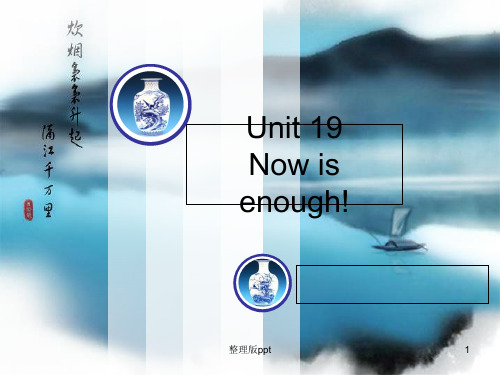
整理版ppt
6
Listening and understanding
1
It was my wife’s idea to come here. She said, ‘You need a vacation. Leave it to me.’ So I did. She made all the reservations. It was a big surprise.
整理版ppt
13
• Don’t worry, leave it to me. • 别担心,有我呢,包在我身上 • Just leave it to me. I'll finish it. • 没问题。一切包在我身上。我会完成的
整理版ppt
14
Listening and understanding
整理版ppt
7
reservation [rezə'veɪʃ(ə)n]
• n. 预约,预订;保留 • reservation service 预约服务
• hotel reservation酒店预订;订旅馆
• make a reservation预定(房间、票)预约
整理版ppt
8
• I’d like to make a reservation. • 我想预约。
A. There; be
B. There; have
C. It; be
D. There; having
整理版ppt
25
• 二、 be used to do something的意思是“被用来做某事”,是动词短 语use ...to do的被动语态结构,used是动词的过去分词(be done 被 动时态)。它可以用各种时态。
青少版新概念英语3B知识点

Unit 21
said/told someone (that) 1.“I am very glad to visit your school”, she
said. ——>
She said she was very glad to visit our school.
2. Tom said, “We are listening to the pop music.” ——>
days.’
Unit 22
与when,where,why,how,if/wether连用的带“倒 移”的间接疑问句
*间接疑问句用陈述句语序,从句时态要倒移 1. Where can I buy knitting needles?(Direct question)
→She asked me where she could buy knitting needles. (Indirect question) 2. Have you tried Janner’s ?
1.Daisy’s the person. Daisy can help him.
2.It’s the story. The story is important.
3.It was Nina’s friend. Nina’s friend made the dress.
4.She knows the woman. The woman introduced the bride and groom.
Unit 18
Direct question:Is it raining? Indirect question: He asked if / whether it was raining.
1.Will you let him learn karate? 2.Can he learn karate? 3.Have you asked Mum about karate lessons? 4.Where are you going ? 5.Can he ski? 6.Will Paul join the program?
新概念青少版-3Bunit18
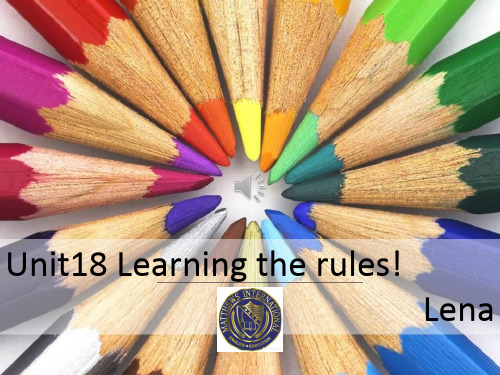
Karen: Oh, dear! What is it, William? William : Robert wants to learn karate. He doesn't know whether you'll let him.
want to想要做;想 要… We want to be quite clear on this point. 关于这一点,我们要 完全弄清。
Ed asked Paul* if he can ski. He want to know * whether Paul will join the program. Claire’s not sure * whether she’ll stay at the library. Lucy will say * if she needs some help. Can you find out * if Nina still seeing Alan
William: It's a martial art! It's about fighting! Karen: All competitions are a kind of fighting. The martial arts are also about rules!
新概念英语青少版入门 B Unit 3

• There’s a window in the bedroom. • There isn’t a window in the bedroom. • There’s a bed between the table and the
door.
• Is there a bed between the table and the doom. My bed is big. • 那是我的卧室,我的卧室很大。 • It’s between the door and the window. • 它在门和窗户之间。 • There’s a little table next to my bed. • 有一个小桌子紧挨着我的床。 • There isn’t a desk. • 没有一个课桌。
• That's our grandfather.
• He's in the bath. • That's their dog.
• I think.
• Look at its big mouth and teeth.
There is a
in the room.
• There’s a desk in the bedroom. (变问句) • Is there a desk in the bedroom ? • There’s a lamp on the table. • There isn’t a lamp on the table. • There’s a shelf behind the bed. • Is there a shelf behind the bed?
Unit3
Get off the bed !
Warm Up
•1.Review the words.(Fast motion.) •2.Read it.
新概念 青少版 3B Unit 22知识讲解

Q&A:
8.Polly has tried Janner’s , hasn’t she? 9. Who did she have a mad conversation
with yesterday? 10. What did Polly ask the Sales Assistant? 11.What did the Sales Assistant say? 12. What exactly did she use to buy them
• department:部门 department store百货公司
Q&A:
1.Does anyone still knit? 2.Does Janner’s still sell knitting needles?
Why?/Why not?
3.What does Polly want to buy?
Annie: Have you tried Janner’ s?(现在完成时)
Polly: Yes, I have! I had a mad conversation with the Sales Assistant yesterday.
Annie: What happened?
Polly: ①I asked her where I could find knitting needles. →
on the first floor? 13. What did she say to the Assistant at the
end of their conversation?
Listening and understanding:
Polly: Do you know where I can buy knitting needles, Annie?
青少版新概念3B--U23

Words and expressions
dollar: n. 元 traditional: adj. 传统的
traditional culture 传统文化 choose—chose—chosen:选择 Exhibition展览 exhibition hall 展览厅 art exhibition 艺术展览;美术展览 exhibition centre 展览中心 on exhibition 展出中 awful 糟糕的
(3)may, might可以推测现在正在发生的动作或过去发 生的动作。 He may / might be sleeping now. The boy may / might not be watching TV at home. 这个男孩可能没在家看电视 These students may / might have seen the film before.(过去) 这些学生以前可能看过这部电影。
Listening and understanding
本课主线时态:一般过去时 It had been a long day. (过去完成时) The judges had chosen fourteen sculptures for the exhibition. (过去完成时) They wanted a fifteenth, and they wanted to go home. (代替a fifteenth sculpture) They looked at two more pieces. One was a man’s head. They didn’t like it. The other was a square, modern piece. The judges chose the modern piece. Then they went home.
青少版新概念3B 51-52

Daisy: Nina tells me you want to make a home movie ,Alan .
Alan: I have a cousin who wants me to . I don’t know where to begin .
Try to forget about him.
别再想他了。 forget sb to sb 代某人向某人问候 Don't forget me to your brother. 别忘记代我问候你兄弟。
forget
v.忘记 forget v-ing, forget to-v forget后接动名词或动词不定式都表示“忘记”。其区 别是:后接动名词表示“忘记曾经做过或发生的事”(该 事已经发生过了); 后接动词不定式则表示“忘记去做某 事”(该事尚未发生)。 He has forgotten to pay me.
1.Can you表示礼貌的请求。 2.any advice:any+不可数名词,用于疑问句。 3.I’ll be happy to:许多形容词后可以跟带 to的动词不定式短语,重复该不定式短语时,缩 写为to。
4.take notes:记笔记
Alan: So what’s the first thing ? Daisy: The first thing is always the story . The best movies are the ones which tell a story.
advice
n.意见,建议 不可数名词 Good advice is beyond price. 忠告好,无价宝。 take/follow advice 听从劝告 We took/follow his advice to remain silent. 我们接受了他的忠告,保持沉默。
008 新概念英语青少版3B 教案

Unit 16 Paul emails home类型内容重点单词及拓展 1. climb【释义】动词攀登【辨析】climb up 向上爬,攀登climb down下来,趴下来climber登山者2. cheaply【释义】副词便宜地【辨析】cheapness廉价3. less【释义】形容词较少的(less的比较级)副词较少地,较小地4.still【释义】副词仍然形容词静止的名词寂静4.ski to +地点【释义】滑雪去某地5. be able to【释义】能,会,能够6.ask sb to do sth【释义】要求某人做某事【辨析】ask sb not to do sth要求某人不要做某事重点句型 1.I ask him to close the door.2.I ask him not to close the door.3.I told him to close the door.4.I told him not to close the door重点语法【名称】双宾语结构【构成】主语+及物谓语动词+间接宾语(人)+直接宾语(物)E.g: He brings me a gift.主语+及物谓语动词+直接宾语(物)+to/for+间接宾语(人)E.g: He brings a gift to me.用to侧重指动作的方向,表示朝着,向着,对着某人。
用for侧重指动作的受益者,表示为了某人,替某人。
常跟双宾语的动词有:需借助t o的bring, give, lend, hand, pass, pay, promise, return, send, show, teach,tell, write, ask,等。
需借助for的buy, call, cook, choose, draw, find, get, make, order, sing, save, spare,等。
家庭作业 1.听读课文20分钟2.抄写单词2遍3.练习册4.背单词和课文(2段)家长签名反馈Unit 17 I hope he hasn’t told her!类型内容重点单词及拓展 1. phone【释义】名词电话,听筒动词打电话【辨析】过去式phoned 过去分词phoned 现在分词phoning2. get on【释义】进行,上车,变老,对付【辨析】get on with与...友好相处3. purse【释义】女士钱包【辨析】wallet 钱包,皮夹4.hear from【释义】收到...来信从...听到5. so many+可数名词so much+不可数名词【释义】这么多...如此多...重点句型 1.She has lost her purse2.She hasn’t lost her purse.3.Has she lost her purse? Yes,she has. No,she hasn’t.重点语法【名称】现在完成时定义:现在完成时用来表示之前已发生或完成的动作或状态,其结果的确和现在有联系。
青少版新概念3B 24
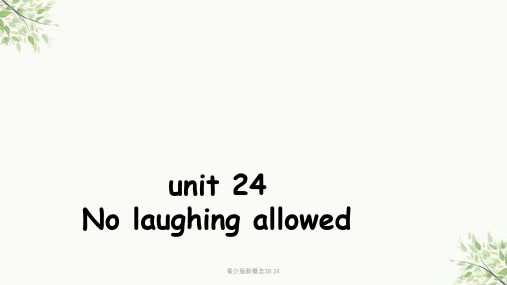
trouble v. “(使)烦恼”、“麻烦”、“费心”等,可用作及物或 不及物动词 1 trouble to do sth 意为“费心做某事”,通常用于 否定句或疑问句。 Don’t trouble to come out, please. 请留步,别出来啦。 2 trouble sb for [to do] sth 意为“麻烦某人做某 事”,通常用于疑问句,句首通常 用 may, might, can, could 等情态动词,表示客气的 请求。 Can I trouble you for the time? My watch seems to havestopped. 请问现在几点钟了?我的表好像停了
5 get into trouble 意为“陷入困境”、“引起指责” He’s always getting into trouble (with the teacher
). 他老闯祸(挨老师的骂。)
6 be in trouble 意为“处于不幸(苦恼,困境)之中” Please telephone us when you are in trouble. 有困难给我们来电话。
desert n.沙漠, 不毛之地
Vast areas of land have become desert.
大片的土地已变成沙漠
desret v.抛弃 舍弃 遗弃
True friends don't desert each other
when one is facing trouble.
当其中一人面临困难时,真正的朋友是不会抛
While she was listening to the radio, she fell asleep. 她听着收音机睡着了。
新概念英语青少版语法知识汇总
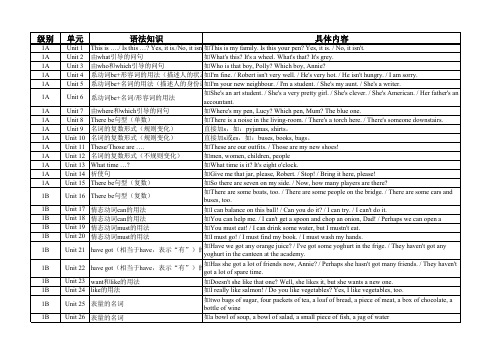
如Doesn't she like that one? Well, she likes it, but she wants a new one.
Unit 24 like的用法
如I really like salmon! / Do you like vegetables? Yes, I like vegetables, too.
Unit 21
have
got(相当于have,表示“有”)的如 y用ogH法hauvret
we got any orange juice? / I've in the canteen at the academy.
got
some
yoghurt
in
the
frige.
/
They
haven't
got
any
Unit 12 名词的复数形式(不规则变化)
如men, women, children, people
Unit 13 What time …?
如What time is it? It's eight o'clock.
Unit 14 祈使句
如Give me that jar, please, Robert. / Stop! / Bring it here, please!
2A
Unit 9 want表“意愿或想法”的用法;be goingwtaon表t的“用意法愿:”s的b. 用wa法nt to do与sb. want sb. to do
2A
Unit 10 一般现在时、现在进行时与一般将来时(一 动b般 作e 现 ,go在 一ing时 般to表 将)示 来习 时惯 表性 示或 未经 来常 要性 发的 生行的为行或为动或作动,作现。在进行时表示此刻正在发生的行为或
- 1、下载文档前请自行甄别文档内容的完整性,平台不提供额外的编辑、内容补充、找答案等附加服务。
- 2、"仅部分预览"的文档,不可在线预览部分如存在完整性等问题,可反馈申请退款(可完整预览的文档不适用该条件!)。
- 3、如文档侵犯您的权益,请联系客服反馈,我们会尽快为您处理(人工客服工作时间:9:00-18:30)。
2.He phoned a friend first. Then he cooked a meal.
3.She watched the news on TV. She fell asleep.
4.He read the book. Then he saw the film.
nit 18
Direct question:Is it raining? Indirect question: He asked if / whether it was raining.
1.Will you let him learn karate? 2.Can he learn karate? 3.Have you asked Mum about karate lessons? 4.Where are you going ? 5.Can he ski? 6.Will Paul join the program.?
Unit 19
肯定句:I used to play football. 否定句:I didn’t use to / I never used
to play football. 疑问句: Did you use to play football?
.
Unit 20
过去完成时的结构: 肯定句:主语+had+过去分词 否定句:主语+had not+过去分词 一般疑问句:Had+主语+过去分词
school.” 3) She says, "He always feels tired.’’ 4) “I never eat meat.” he says. 5) The teacher says, “The sun rises in the east
and goes down in the west..”
climb. 6.Don’t get a taxi. Take the. bus instead.
Unit 17
He said,“I am very sorry.”(直接引语) ——>He said that he was very sorry. (间接引语) 1)He says, “I have been to the Great Wall.” 2) She says, “I am very glad to visit your
days.’
.
Unit 22
与when,where,why,how,if/wether连用的带“倒 移”的间接疑问句
*间接疑问句用陈述句语序,从句时态要倒移 1. Where can I buy knitting needles?(Direct question)
Tom said that they were listening to the pop music.
3.
.
3. “Why did she refuse to go there?” the teacher asked. — —>
The teacher asked why she had refused to go there. 4. Tom said, “We were having a football match this time
青少版新概念英语3B知识点总结
.
Unit16
ask/tell someone (not) to do something Please close the door. —— I asked /told him to close the door. 1.Please don’t close the door. 2.Please don’t leave the door open. 3.Please keep silent. 4.Please don’t move. 5.We want you to lead someone up an easy
yesterday.” ——> Tom said that they were having a football match that time
the day before. 5. He said,“I haven't heard from my parents these days.”
——> He said that he hadn't heard from his parents those days. 6. He said, ‘I’ll call you tomorrow.’ ——> He said that he would call me the next day.
.
1. She said, ‘I’m tired.’ 2. She said, ‘I was tired this morning.’ 3. He said, ‘ I’m learning Chinese.’ 4. He said, ‘We are students now.’ 5. She said, ‘I’ve already read that book.’ 6. He said, ‘ I’ll go to Hongkong next week.’ 7. She said, ‘ I’m going to get married in April.’ 8. He said, ‘ I’ve just seen a puma in the garden.’ 9. She said, ‘ There are some big cats around these
.
Unit 21
said/told someone (that)
1.“I am very glad to visit your school”, she said. ——>
She said she was very glad to visit our school.
2. Tom said, “We are listening to the pop music.” ——>
